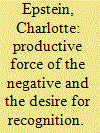| Srl | Item |
| 1 |
ID:
162489


|
|
|
|
|
| Summary/Abstract |
In this article I theorise the concept of misrecognition that we aim to bring to the study of international politics with this Special Issue. I draw upon three sources to do so: recognition theory, Hegel, and Jacques Lacan. I show that, while the seeds of an interest in misrecognition were laid in that interdisciplinary Hegelian scholarship known as recognition theory, it remains underdeveloped. To develop it into a concept I chart a path through recognition theory back to Hegel’s original dialectic of the master and servant in the Phenomenology of Spirit. What the dialectic captures, I argue, are the actual dynamics of misrecognition in social life, not an idealised form of recognition. This foundational, constitutive misrecognition is what Lacan also theorises by way of his concept of ‘fantasy’. Both Hegel and Lacan foreground a misrecognised, desiring subject that challenges the ways in which agency has been understood in international politics. Lastly, I show the purchase of a Hegelian-Lacanian analysis for IR by considering the relations between sovereignty and nuclear weapons under the lens of fantasy.
|
|
|
|
|
|
|
|
|
|
|
|
|
|
|
|
| 2 |
ID:
161495


|
|
|
|
|
| Summary/Abstract |
A succession of media scandals and policy arguments in the UK in recent years has been integral to the construction of a so-called ‘Muslim Problem’. Media and political attention paid to Muslims in British public life, across a vast and varied range of issues, suggests a social preoccupation that exceeds the security framing the ‘War on Terror’ once imposed. In this article, we develop and apply Slavoj Žižek’s Lacanian theory of ideology to produce an original conceptual and analytic framework centred on the social functions served by, as well as the co-constitution of, anxiety and fantasy. We then apply this framework to explore three scandals relating to child sexual exploitation, halal meat and education. We show that the representations of British Muslims that these scandals entail are best understood as ideological fantasies, mobilized to suture traumatic gaps and conceal contradictions in wider social practices around such issues. We argue that the unrelenting media and political focus on myriad aspects of British Muslims’ imagined lives is symptomatic of what Žižek calls an ‘unbearable anxiety’: Islamophobic ideological fantasies conjure a ‘conceptual Muslim’ to sidestep confrontation with the Lacanian ‘Real’ – antagonistic and anxiety-inducing structures and practices underpinning British society, of which we do not speak.
|
|
|
|
|
|
|
|
|
|
|
|
|
|
|
|